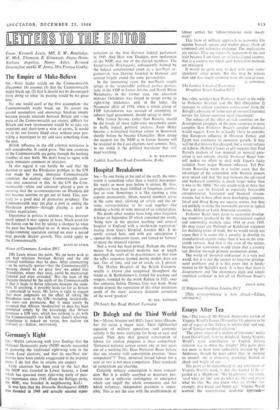Sul,—One wonders how Professor Bauer in his reply to Professor
Streeten and Mr Hill (December 2) manages to extract 'extensive confiscation' from Dr Balogh's advocacy of 'some sort of universal national service for labour-intensive rural investment.'
The subject of the effect of rich countries on the development prospects of the poor countries is more complex than Professor Bauer's cavalier dismissal would suggest. Even he is hardly likely to consider that European influence in Ottoman Turkey and Egypt was conducive to economic growth. It may well be that history has changed, but a recent volume on Liberia (Robert Clower et al.) suggests that Paul Baran's analysis of raw material or mineral para- sitism is not entirely invalid. Professor Bauer him- self makes no effort to deal with Japan's lucky isolation from major Western influence. Yet Pro- fessor Rosovsky wrote in a recent essay that the advantages of the connection with Western powers were mixed and that 'the gap between the advanced and backward countries is much larger today than it was in the 1880s.' No one would wish to deny that that gap can be bridged in especially favourable entrepreneurial, locational and financial circum- stances, but it does affect most developing countries. Israel and Hong Kong are success stories, but they are unlikely to strike the reasonable person as typical Asian, African or Latin American countries.
Professor Bauer must point to successful develop- ing countries produced by the international capital and commodity markets since 1914 or even 1945. He may reject any Prebisch or Kaldorian argument for declining terms of trade, but he would surely not argue that it is easier for a country to develop its manufactured exports today than it was in the nine- teenth century. And that is the crux of the matter, because few economists would claim that a country can develop through primary production alone.
The world of 'personal endeavour' is a very real world, but it is not the answer to long-run develop- ment problems and it is this point that is funda- mental to Dr Balogh's work. It is here that there is disagreement and 'the elementary logic and simple empirical evidence' is not all on Professor Bauer's side.
ANGUS HONE 52 Ridgmount Gardens. London WCI
[This correspondence is now closed.—Editor, SPECTATOR.]






























 Previous page
Previous page